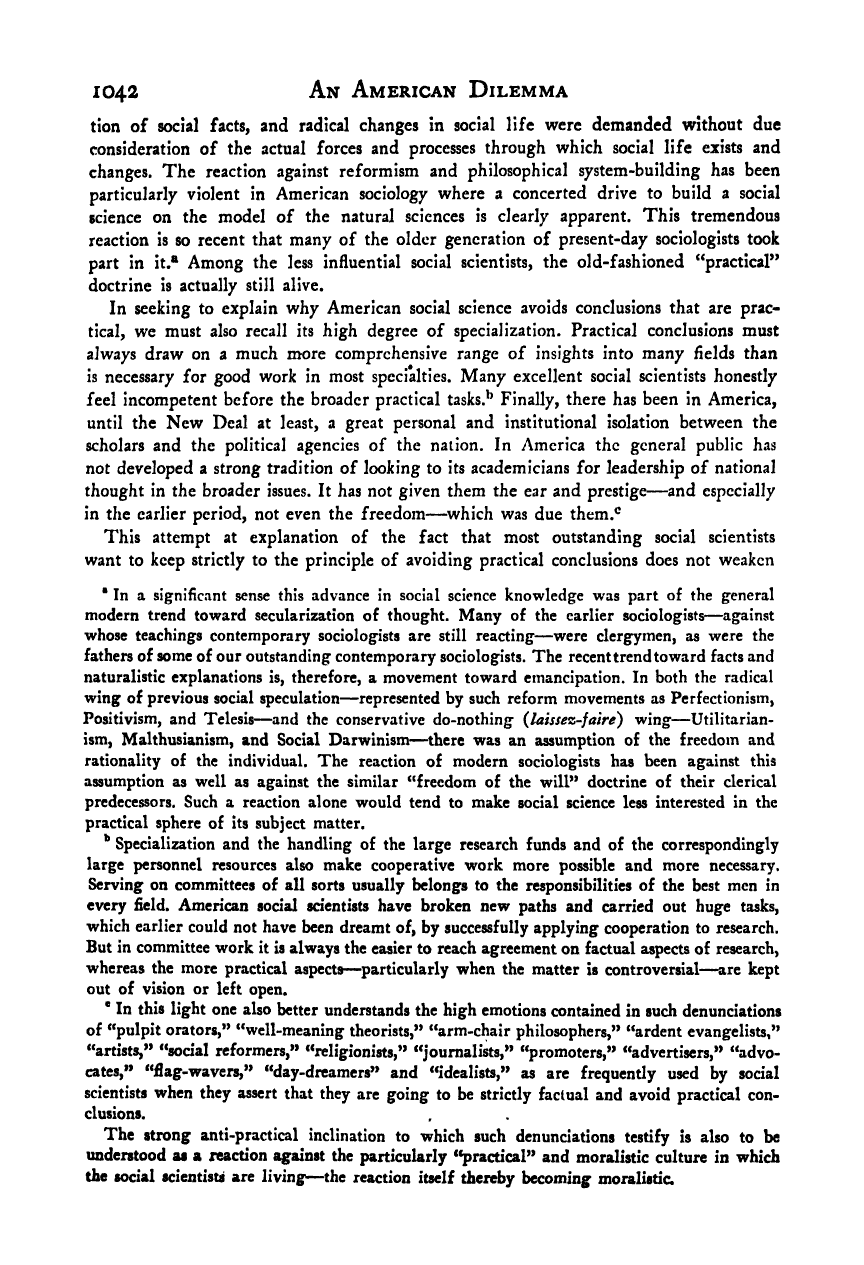Note: Gunnar Myrdal died in 1987, less than 70 years ago. Therefore, this work is protected by copyright, restricting your legal rights to reproduce it. However, you are welcome to view it on screen, as you do now. Read more about copyright.
Full resolution (TIFF) - On this page / på denna sida - Appendices - 2. A Methodological Note on Facts and Valuations in Social Science - 2. Methods of Mitigating Biases in Social Science

<< prev. page << föreg. sida << >> nästa sida >> next page >>
Below is the raw OCR text
from the above scanned image.
Do you see an error? Proofread the page now!
Här nedan syns maskintolkade texten från faksimilbilden ovan.
Ser du något fel? Korrekturläs sidan nu!
This page has never been proofread. / Denna sida har aldrig korrekturlästs.
1042 An American Dilemma
tion of social facts, and radical changes in social life were demanded without due
consideration of the actual forces and processes through which social life exists and
changes. The reaction against reformism and philosophical system-building has been
particularly violent in American sociology where a concerted drive to build a social
science on the model of the natural sciences is clearly apparent. This tremendous
reaction is so recent that many of the older generation of present-day sociologists took
part in it.® Among the less influential social scientists, the old-fashioned “practical”
doctrine is actually still alive.
In seeking to explain why American social science avoids conclusions that are prac-
tical, we must also recall its high degree of specialization. Practical conclusions must
always draw on a much more comprehensive range of insights into many fields than
is necessary for good work in most specialties. Many excellent social scientists honestly
feel incompetent before the broader practical tasks.’’ Finally, there has been in America,
until the New Deal at least, a great personal and institutional isolation between the
scholars and the political agencies of the nation. In America the general public has
not developed a strong tradition of looking to its academicians for leadership of national
thought in the broader issues. It has not given them the ear and prestige—and especially
in the earlier period, not even the freedom—^which was due them.^
This attempt at explanation of the fact that most outstanding social scientists
want to keep strictly to the principle of avoiding practical conclusions does not weaken
* In a significant sense this advance in social science knowledge was part of the general
modern trend toward secularization of thought. Many of the earlier sociologists—against
whose teachings contemporary sociologists are still reacting—were clergymen, as were the
fathers of some of our outstanding contemporary sociologists. The recent trend toward facts and
naturalistic explanations is, therefore, a movement toward emancipation. In both the radical
wing of previous social speculation—represented by such reform movements as Perfectionism,
Positivism, and Telesis—and the conservative do-nothing {laissez-faire’) wing—Utilitarian-
ism, Malthusianism, and Social Darwinism—^thcrc was an assumption of the freedom and
rationality of the individual. The reaction of modern sociologists has been against this
assumption as well as against the similar “freedom of the will” doctrine of their clerical
predecessors. Such a reaction alone would tend to make social science less interested in the
practical sphere of its subject matter,
**
Specialization and the handling of the large research funds and of the correspondingly
large personnel resources also make cooperative work more possible and more necessary.
Serving on committees of all sorts usually belongs to the responsibilities of the best men in
every field. American social sdentists have broken new paths and carried out huge tasks,
which earlier could not have been dreamt of, by successfully applying cooperation to research.
But in committee work it is always the easier to reach agreement on factual aspects of research,
whereas the more practical aspects—particularly when the matter is controversial—are kept
out of vision or left open.
* In this light one also better understands the high emotions contained in such denunciations
of “pulpit orators,” “well-meaning theorists,” “arm-chair philosophers,” “ardent evangelists,”
“artists,” “social reformers,” “religionists,” “journalists,” “promoters,” “advertisers,” “advo-
cates,” “flag-wavers,” “day-dreamers” and “idealists,” as are frequently used by social
scientists when they assert that they are going to be strictly factual and avoid practical con-
clusions.
The strong anti-practical inclination to which such denunciations testify is also to be
understood as a reaction against the particularly ^‘practical” and moralistic culture in which
the social scientists are living—the reaction itself thereby becoming moralistic.
<< prev. page << föreg. sida << >> nästa sida >> next page >>